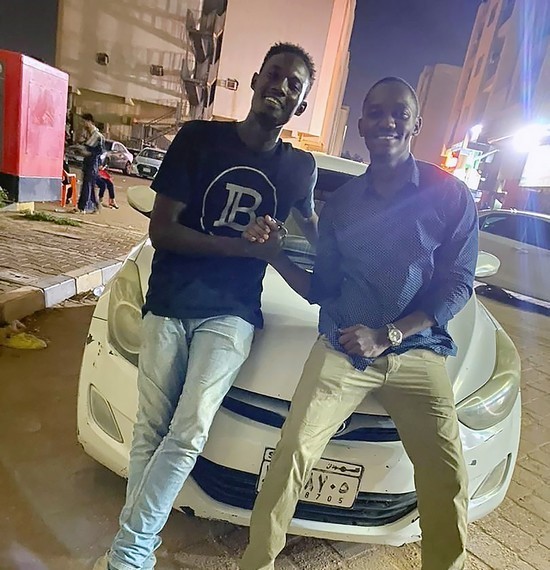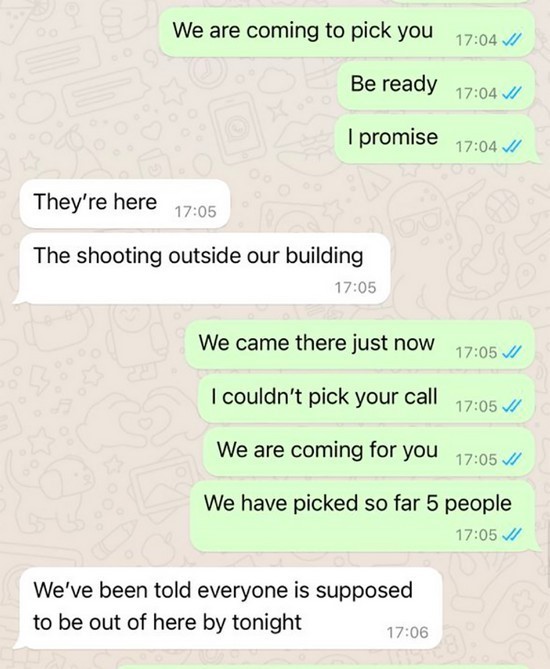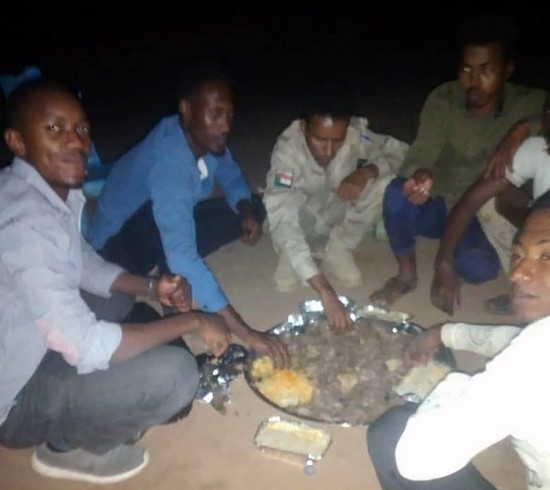In the first days of Sudan’s war, the two university
students felt helpless.
They locked themselves in their apartment in the capital,
Khartoum, glued to Twitter as the battle unfolded. They winced as the walls
shuddered from blasts and gunfire, taking shelter in the corridor. They
wondered where Sudan was going.
اضافة اعلان
On the fifth day, April 19, the phone rang: Someone needed a
taxi.
A senior UN official, a woman in her 40s, was trapped inside
her home in an upscale neighborhood, the caller explained. Her situation was
desperate. Pickup trucks mounted with machine guns stood outside her building,
firing at warplanes that zoomed overhead. Black smoke was streaming into her
apartment after an airstrike nearby. She had run out of water. Her cellphone
battery was down to 5 percent. Could they rescue her?
The students, Hassan Tibwa and Sami Al-Gada, in their final
year of mechanical engineering, had a side gig driving a taxi. But this call
was not a paying job; it was a mercy run. Tibwa phoned the woman. “She was
screaming,” he recalled. “We had only a few minutes before her phone died. She
was on her own.”
They jumped into Gada’s car, a dinged, seven-year-old Toyota
sedan, and set off into the city, horrified at its transformation. Bullet holes
pocked buildings. Charred vehicles littered the streets. Fighters were
everywhere.
Crunching over bullet casings, they navigated a gantlet of
checkpoints manned by jittery fighters from the paramilitary Rapid Support
Forces (RSF), some wearing bandages or limping. The fighters scanned the
students’ phones and peppered them with questions. It took an hour to travel
6.4km.
“We went through hell,” Tibwa said.
They found the UN official, named Patience, alone at her
apartment in an apparently deserted building. She had been hiding in her
bathroom for days, slowly depleting three cellphones, she said, showing them a
scatter of bullet holes in her living room wall.
 An undated photo via
Hassan Tibwa of himself, right, and Sami Al-Gada.
An undated photo via
Hassan Tibwa of himself, right, and Sami Al-Gada.
The students consoled her, wrapped her in an all-covering
abaya robe, and devised a cover story: Their passenger was pregnant and needed
to get to a hospital. They paused to say a prayer. “We knew that the moment we
stepped out, there was no going back,” Tibwa said.
Forty-five minutes and 10 checkpoints later, their Toyota
pulled up outside the Al-Salam, one of Khartoum’s most expensive hotels, now a
five-star refugee camp. Patience wept with relief. After collecting herself and
checking in, she sat the students down to ask an urgent question.
Could they go back and rescue her friends too?Over the next week, Tibwa, 25, and Gada, 23, rescued dozens
of desperate people from one of Khartoum's fiercest battle zones, according to
interviews with the students, those they extracted and hundreds of text
messages. Along the way, they were robbed, handcuffed, and threatened with
execution. Fighters accused them of being spies. Diplomats implored them to
retrieve their passports and pets. Shellfire and stray bullets fell around
their car.
“The bravery of these guys is just amazing,” said Fares
Hadi, an Algerian factory manager who survived a hair-raising ride with them
through Khartoum. “So impressive, so courageous.”
Every rescue interviewed said the students had not asked
for payment.
Over six days, as the war surged between two feuding
military factions — the army and the Rapid Support Forces group — the students
helped at least 60 people: South African teachers, Rwandan diplomats, Russian
aid workers and UN workers from many countries, including Kenya, Zimbabwe,
Sweden, and the US.
“The only word for them is heroes,” a UN official said.
From students to rescuersEven as Tibwa drove strangers to safety, his own family did
not know he was in Sudan.
He arrived in 2017 from Tanzania, where his family runs a
modest hardware store at a small town on Lake Victoria. An Islamic charity
provided a scholarship to study engineering at the International University of
Africa in Khartoum.
But he told his parents that he was going to study in
Algeria, in deference to their concerns about Sudan’s history of violent unrest
— a lie he easily maintained for six years, because he never had enough money
to go home.
Gada is Sudanese but was raised in a sleepy town in
northeastern Saudi Arabia, where his father was a car mechanic.
Classmates in university, the two young men soon became
friends. They shared a bright, open disposition and a gritty entrepreneurial
streak, working odd jobs at night to make rent. Tibwa drove a taxi that catered
mostly to African UN officials.
 An undated image of a
series of texts between Hassan Tibwa and UN official who was trapped by
fighting in her apartment.
An undated image of a
series of texts between Hassan Tibwa and UN official who was trapped by
fighting in her apartment.
Sudan’s turbulent politics disrupted their ambition. Classes
were canceled for much of 2019 when roaring protesters, including Gada, helped
topple President Omar Al-Bashir, Sudan’s dictator of 30 years.
Then, in October 2021, Sudan’s two most powerful military
leaders — Gen. Abdel-Fattah Burhan of the army and Lt. Gen. Mohammed Hamdan
Dagalo of the RSF — joined forces to boot out the civilian prime minister and
seize power for themselves in a coup. Protests flared. The economy tanked.
The two students thought little, at first, of the shots that
rang out across Khartoum early on April 15: Anti-military demonstrators had
been clashing with riot police for more than a year.
But when Gada went to campus to submit a paper, the guards
sent him home. This time, it was not a protest, they said. It was war.
Tibwa and Gada were not the only rescuers. Local Resistance
Committees, formed years earlier to push Sudan toward democracy, pivoted to
helping Sudanese and foreigners flee.
But for some stricken residents, the two students were the
only option.
“They called us,” Tibwa said. “They didn’t have food. They
had no power. Their phones were going down. We tried to imagine ourselves in
that same situation. So we went out.”
A final rescueThe students’ final mission was their longest: a trip across
the Nile to the city of Omdurman, at the request of Rwandan diplomats, to
rescue a woman who, unlike the first they rescued, really was pregnant.
As their Toyota approached the house, the woman, who gave
her name as Fifi, texted them. She wrote, “Alhamdulilah” — Arabic for “Praise
be to God.” She was eight months pregnant and had been stranded with her young
son for 10 days.
By then, an exodus of foreigners from Khartoum was underway.
A dramatic helicopter evacuation the previous night of the
U.S. Embassy, led by the Navy’s SEAL Team 6 commandos, set off a cascade of
evacuations.
Most of the people the students had deposited at the Al
Salam finally left on a U.N. convoy of buses, cars, and four-wheel drives that
made a grueling 35-hour journey to Port Sudan. From there, many took ships
across the Red Sea to Saudi Arabia.
As the foreigners left, most of Khartoum’s 5 million
residents remained. The students stayed behind too, at first.
 An undated photo of
Sami Al-Gada and Hassan Tibwa sharing a meal with soldiers of the Rapid Support
Forces, a paramilitary group.
An undated photo of
Sami Al-Gada and Hassan Tibwa sharing a meal with soldiers of the Rapid Support
Forces, a paramilitary group.
“Khartoum is getting empty now,” Tibwa said from their apartment
last week, the sound of gunfire rattling in the background.
But a day later, they were gone. A friendly RSF commander
had warned them that “something big was coming” in the city center, Tibwa said.
He advised them to get out while they could. They packed up the Toyota and
drove 22km to the edge of the capital, where Gada’s family has a house.
For a few days, they considered their options, working out,
drinking coffee, and reading novels. Fighter jets scudded over the horizon, and
a stray bomb landed nearby, killing members of a family in their home, they
said.
Tibwa wanted to stay in Sudan, a country he said he had
grown to love — and where he was a single semester away from completing his
engineering degree. But his time had run out.
On Wednesday, Gada dropped his friend on a street where he
hoped to catch a bus to Ethiopia and, from there, back to Tanzania.
A personal reckoning loomed, Tibwa noted ruefully: Now his
parents would learn that he had been studying in Sudan, not Algeria, all along.
As they separated, Tibwa pulled out his cellphone and began
filming.
“Saying goodbye to my boy, Sami,” he said as the Toyota
rolled down the street, his partner waving through the window. “See you, man.
See you.”
Read more Region and World
Jordan News



